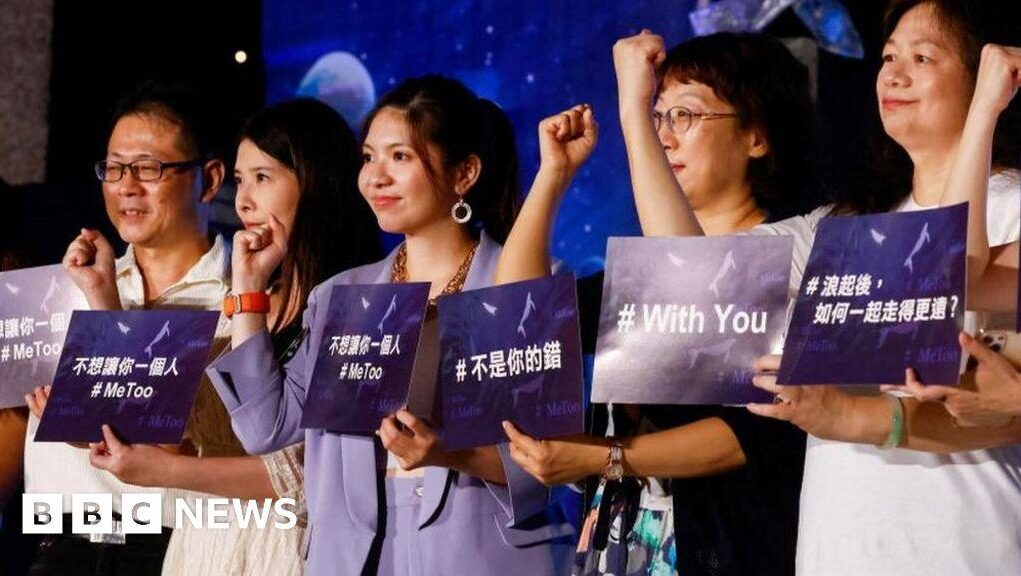Taiwan’s new anti-sexual harassment laws are being seen as a first step in addressing its MeToo reckoning, but activists say they still fall short.
The ruling Democratic Progressive Party raced to toughen laws after it was hit by a wave of sexual assault claims.
It led to several resignations from the party and sparked further allegations against other powerful figures, including celebrities.
The new laws, which were passed this week, come ahead of a crucial election.
Law professor Carol Lin praised the changes as a legislative milestone but said it will take time for society to shed entrenched mindsets that normalise sexual harassment.
Although Taiwan has long been hailed as a progressive democracy, much of its society remains deeply patriarchal and hierarchical.
The new laws passed in a special legislative session require all workplaces – including previously exempt small businesses with at least 10 employees- to set up channels for reporting sexual harassment.
Employers must also investigate all sexual harassment complaints and report their findings to local labour authorities.
Those who fail to do so can be fined up to 1m New Taiwan dollars ($31,700).
Previously, alleged victims had no recourse apart from court trials.
Under the new laws, the use of discriminatory or insulting language against someone on account of their gender, as well as acts that punish others professionally for rejecting one’s advances will be considered sexual harassment.
The statute of limitations has also been extended.
“I think we need to see some ‘success stories’ of the new law taking harassers to task before victims will feel empowered to step forward,” said Prof Lin, from Taiwan’s National Yang Ming Chiao Tung University.
And Taiwan’s former Labour Minister Wang Ju-hsuan said the amendments still do not give victims proper recourse in cases where the harassment happens outside the workplace.
For instance, some activists have pointed out that the new laws do not address deep-seated sexual harassment in religious institutions.
Ms Wang, who is a lawyer, also wants heftier penalties to prevent “malicious retaliation” and said a platform to encourage witnesses to intervene should be set up.
“It is challenging for victims to provide evidence, not to mention the fear of retaliation and pressure from societal discrimination,” she told Taiwan News.
Media influencer Anissa Chang, who is among the MeToo accusers, said the legal changes are “beneficial in instilling fear” in those who abuse their authorities to assault others – which she said is a common practice in industries like entertainment.
“Criminal, harassing actions are strangely regarded as norms or even referred to as ‘unspoken rules’. This is a highly distorted societal phenomenon,” she said.
The new laws also apply to schools.
Educators are now explicitly banned from having romantic relationships with students under the age of 18. Teachers and principals who fail to report student complaints of harassment to the Ministry of Education are liable to be fined.
The new laws must be accompanied with an overhaul of gender equity and sex education in schools, said Wang Yueh-Hao, chief executive of Taiwanese non-profit Garden of Hope Foundation.
“People are expected to always obey their elders and superiors, which is why it has taken so long for these victims to come forward. Such mindsets must change,” she said.
Nevertheless, Ms Wang said her organisation which supports victims of sexual violence has seen a 20-fold rise in cases lodged by alleged victims in the past two months. She considers this a sign that Taiwan’s MeToo movement, although long-delayed, has been constructive.
The Netflix hit Wave Makers has been credited as the inspiration for the movement.
The series, which was about Taiwanese political staffers working on an election, includes a pivotal scene where a party spokeswoman decides to act on a female staffer’s complaint about being sexually harassed by a colleague, although the revelation could be damaging to the party.
This prompted many Taiwanese with similar experiences to step forward.
But the reckoning has also stirred a backlash, with many people questioning the alleged victims’ motives.
Such reactions are a case in point that it isn’t just the law that needs to change, but people’s attitudes as well, Ms Lin said.
“Ultimately, the truly effective changes will lie in gender education and the social culture,” she said. “Society needs to stop blaming the victims.”
MeToo allegations against celebrities shake Taiwan
China’s silenced feminist: How a journalist went missing








